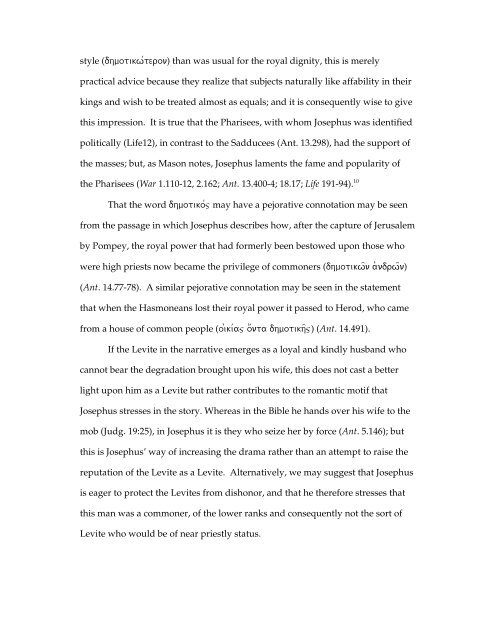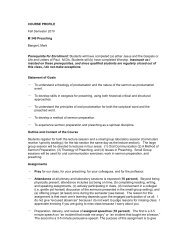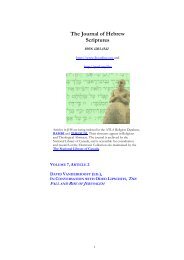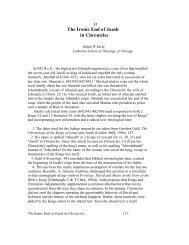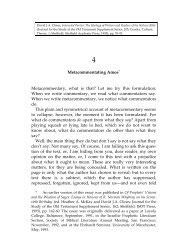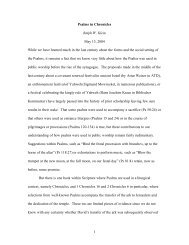Create successful ePaper yourself
Turn your PDF publications into a flip-book with our unique Google optimized e-Paper software.
style (<br />
) than was usual for the royal dignity, this is merely<br />
practical advice because they realize that subjects naturally like affability <strong>in</strong> their<br />
k<strong>in</strong>gs and wish to be treated almost as equals; and it is consequently wise to give<br />
this impression. It is true that the Pharisees, with whom <strong>Josephus</strong> was identified<br />
politically (Life12), <strong>in</strong> contrast to the Sadducees (Ant. 13.298), had the support of<br />
the masses; but, as Mason notes, <strong>Josephus</strong> laments the fame and popularity of<br />
the Pharisees (War 1.110-12, 2.162; Ant. 13.400-4; 18.17; Life 191-94). 10<br />
That the word<br />
may have a pejorative connotation may be seen<br />
from the passage <strong>in</strong> which <strong>Josephus</strong> describes how, after the capture of Jerusalem<br />
by Pompey, the royal power that had formerly been bestowed upon those who<br />
were high priests now became the privilege of commoners ( )<br />
(Ant. 14.77-78). A similar pejorative connotation may be seen <strong>in</strong> the statement<br />
that when the Hasmoneans lost their royal power it passed to Herod, who came<br />
from a house of common people ( ) (Ant. 14.491).<br />
If the Levite <strong>in</strong> the narrative emerges as a loyal and k<strong>in</strong>dly husband who<br />
cannot bear the degradation brought upon his wife, this does not cast a better<br />
light upon him as a Levite but rather contributes to the romantic motif that<br />
<strong>Josephus</strong> stresses <strong>in</strong> the story. Whereas <strong>in</strong> the Bible he hands over his wife to the<br />
mob (Judg. 19:25), <strong>in</strong> <strong>Josephus</strong> it is they who seize her by force (Ant. 5.146); but<br />
this is <strong>Josephus</strong>’ way of <strong>in</strong>creas<strong>in</strong>g the drama rather than an attempt to raise the<br />
reputation of the Levite as a Levite. Alternatively, we may suggest that <strong>Josephus</strong><br />
is eager to protect the <strong>Levites</strong> from dishonor, and that he therefore stresses that<br />
this man was a commoner, of the lower ranks and consequently not the sort of<br />
Levite who would be of near priestly status.


